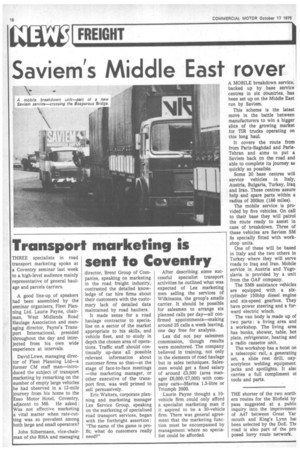Transport marketing is sent to Coventry
Page 18

If you've noticed an error in this article please click here to report it so we can fix it.
THREE specialists in road transport marketing spoke at a Coventry seminar last week to a high-level audience mainly representative of general haulage and parcels Carriers.
A good line-up of speakers had been assembled by the seminar organisers, Fleet Planning Ltd. Laurie Payne, chairman, West Midlands Road Haulage Association and managing director, Payne's Trans. port International, presided throughout the day and interjected from his own wide experience at intervals, David Lowe, managing director of Fleet Planning Ltd—a former CM staff man—introduced the subject of transport marketing by remarking on the number of empty large vehicles he had observed in a 12-mile journey from his home to the Esso Motor Hotel, Coventry, adjacent to M6. He asked : Was not effective marketing a vital matter when rate-cutting was so prevalent among both large and small operators?
John Silbermann, vice-chairman of the RHA and managing director, Brent Group of Companies, speaking on marketing in the road freight industry, contrasted the detailed knowledge of car hire firms about their customers with the customary lack of detailed data maintained by road hauliers.
It made sense for a road haulage contractor to specialise on a sector of the market appropriate to his skills, and vehicle fleet, and to study in depth the chosen area of operations. Traffic staff should continually up-date all possible relevant information about customer firms so that—at the stage of face-to-face meetings —the marketing manager, or other executive of the transport firm, was well primed to sell persuasively.
Eric Walters, corporate planning and marketing manager Lex Service Group, speaking on the marketing of specialised road transport services, began with the forthright assertion : "The name of the game is profit; what do customers really need?" After describing some successful specialist transport activities he outlined what was expected of Lex marketing men selling the services of Wilkinsons, the group's smalls carrier. It should be possible for salesmen to arrange six planned calls per day—all confirmed appointments—making around 25 calls a week leaving, one day free for analysis.
Lex did not pay salesmen commission, though results were monitored. The company believed in training, not only in the elements of road haulage but in sales techniques. Salesmen would get a fixed salary of around £3,500 (area manager £6,000/£7,000) with company cars—Marina 1.3-litre or Triumph 2000.
Laurie Payne thought a 10vehicle firm could only afford a specialist marketing man if it aspired to be a 30-vehicle firm. There was general agreement that the marketing function must be encompassed by management •where no specialist could be afforded.
































































































